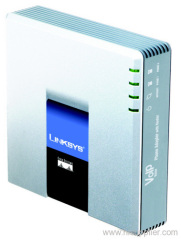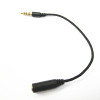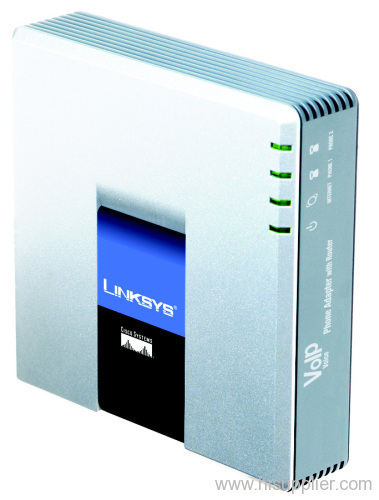lToll-quality voice and carrier-grade feature support: The Cisco SPA2102 delivers clear, highquality voice communication under a variety of network conditions. Excellent voice quality in challenging, changeable IP network environments is made possible via the advanced implementation of standard voice coding algorithms. The SPA2102 is interoperable with common telephony equipment such as fax, voicemail, PBX/KTS, and interactive voice response systems.
lLarge-scale deployment and management: The Cisco SPA2102 enables service providers to provide customized services to their subscribers. It can be remotely provisioned and supports dynamic, in-service software upgrades. A highly secure profile upload saves providers the time and expense of managing and preconfiguring or reconfiguring customer premises equipment (CPE) for deployment.
lIronclad security: The Cisco SPA2102 supports highly secure, encryption-based methods for communication, provisioning, and servicing.
Specifications | |
Data networking | lMAC address (IEEE 802.3) lIPv4 (RFC 791) lAddress Resolution Protocol (ARP) lDNS-A record (RFC 1706), SRV record (RFC 2782) lDynamic Host Configuration Protocol (DHCP) client (RFC 2131) lDHCP server (RFC 2131) lInternet Control Message Protocol (ICMP) (RFC 792) lTCP (RFC 793) lUser Datagram Protocol (UDP) (RFC 768) lReal Time Protocol (RTP) (RFC 1889, 1890) lReal Time Control Protocol (RTCP) (RFC 1889) lDifferentiated Services (DiffServ) (RFC 2475), type of service (ToS) (RFC 791, 1349) lSimple Network Time Protocol (SNTP) (RFC 2030) lUpload data rate limiting: static and automatic lQuality of service (QoS): voice packet prioritization over other packet types lRouter or bridge mode of operation lMAC address cloning lPort forwarding |
Voice gateway | lSession Initiation Protocol (SIP) v2 (RFC 3261, 3262, 3263, 3264) ØSIP proxy redundancy-dynamic via DNS SRV, A records ØReregistration with primary SIP proxy server lSIP support in Network Address Translation (NAT) networks (including Serial Tunnel [STUN]) lHighly secure (encrypted) calling via prestandard implementation of Secure RTP |
Voice algorithms | lCodec name assignment lG.711 (A-law and u-law) lG.726 (16/24/32/40 kbps) lG.729 A lG.723.1 (6.3 kbps, 5.3 kbps) lDynamic payload lAdjustable audio frames per packet lSupport G.729 by the two FXS phone ports simultaneously |
Voice specifications | lDual-tone multifrequency (DTMF): in-band and out-of-band (RFC 2833) (SIP info) lFlexible dial plan support with interdigit timers and IP dialing lCall progress tone generation lJitter buffer-adaptive lFrame loss concealment lFull duplex audio lEcho cancellation (G.165/G.168) lVoice activity detection (VAD) with silence suppression lAttenuation/gain adjustments lFlash hook timer lMessage waiting indicator (MWI) tones lVisual message waiting indicator (VMWI) via frequency shift keying (FSK) lPolarity control lHook flash event signaling lCaller ID generation (name and number)-Bellcore, DTMF, European Telecommunications Standards Institute (ETSI) lMusic on hold client lStreaming audio server-up to 10 sessions |
Fax capability | lFax tone detection pass-through lFax: G.711 pass-through or real-time fax over IP via T.38 (T.38 support is dependent on fax machine and network/transport resilience.) |
Security | lPassword-protected system reset to factory default lPassword-protected administrator and user access authority lProvisioning/configuration/authentication: HTTPS with factory-installed client certificate lHTTP digest-encrypted authentication via MD5 (RFC 1321) lUp to 256-bit Advanced Encryption Standard (AES) encryption |
Provisioning, administration, and maintenance | lWeb browser administration and configuration via integral web server lTelephone keypad configuration with interactive voice prompts lAutomated provisioning and upgrade via HTTPS, HTTP, Trivial File Transfer Protocol (TFTP) lAsynchronous notification of upgrade availability via NOTIFY lNonintrusive, in-service upgrades lReport generation and event logging lStats in BYE message lSyslog and debug server records-per-line configurable lPer-line and purpose configurable syslog and debug options |
Physical interfaces | lTwo 100BASE-T RJ-45 Ethernet ports (IEEE 802.3) l2 RJ-11 FXS phone ports-for analog circuit telephone device (tip/ring) |
Subscriber line interface circuit (SLIC) | lRing waveform: trapezoidal and sinusoidal * lMaximum ringer load: 3 ringer equivalence numbers (RENs) lOn-hook/off-hook characteristics: ØOn-hook voltage (tip/ring): -50V nominal ØOff-hook current: 25 mA min ØTerminating impedance: 8 configurable settings including North America 600 ohms, European CTR21 |
Regulatory compliance | FCC (Part 15, Class B) , CE, ICES-003 |
Power supply | lSwitching type (100¡¡¡§¬C240V) automatic lDC input voltage: +5V DC at 2.0A maximum lPower consumption: 5W lPower adapter: 100¡¡¡§¬C240V, 50¡¡¡§¬C60 Hz (26¡¡¡§¬C34VA) AC input, 1.8-m cord |
Indicator lights/LED | Power, Internet, Phone 1, Phone 2 |
Environmental | |
Dimensions W x H x D | 3.98 x 3.98. x 1.10 in. (101 x 101 x 28 mm) |
Unit weight | 5.29 oz (0.15 kg) |
Operating temperature | 32º~113ºF (0º~45ºC) |
Storage temperature | -13º~185ºF (-25º~85ºC) |
Operating humidity | 10%~90% noncondensing |
Storage humidity | 10%~90% noncondensing |
Standard Component:
Item | Qty | Remarks |
Phone Adapter SPA2102 | 1 | |
Manual | 1 | Printed |
Ethernet Cable | 1 | |
Power Supply | 1 |
Packing
G.W./unit | 0.5kg |
Carton MEAS | 58*54*34cm |
G.W. | 21kg |
PCS/CTN | 40pcs |
Inexpensive, easy to install, and simple to use, the Cisco® SPA2102 Phone Adapter with Router (Figure 1) connects a standard telephone or fax machine to an IP-based data network. Voice over IP (VoIP) service providers can offer residential and business users traditional and enhanced communication services via the customer¡¯s broadband connection to the Internet.
The Cisco SPA2102 features two basic telephone ports to connect existing analog phones or fax machines to a private branch exchange (PBX) system. It also includes two 100BASE-T RJ-45 Ethernet interfaces to connect to a home or office LAN, as well as an Ethernet connection to connect a broadband modem or router (WAN). Each phone line can be configured independently via software controlled by the service provider or the end user. With the SPA2102, users are able to protect and extend their investment in their existing analog telephones, conference speakerphones, and fax machines, as well as control their migration to IP with an extremely affordable, reliable solution.
Installed by the end user and remotely provisioned, configured, and maintained by the service provider, each Cisco SPA2102 converts voice traffic into data packets for transmission over an IP network. Compact in design, the SPA2102 can be used in consumer and business VoIP service offerings, including full-featured IP Centrex environments. The SPA2102 uses international standards for voice and data networking for reliable operation.




















